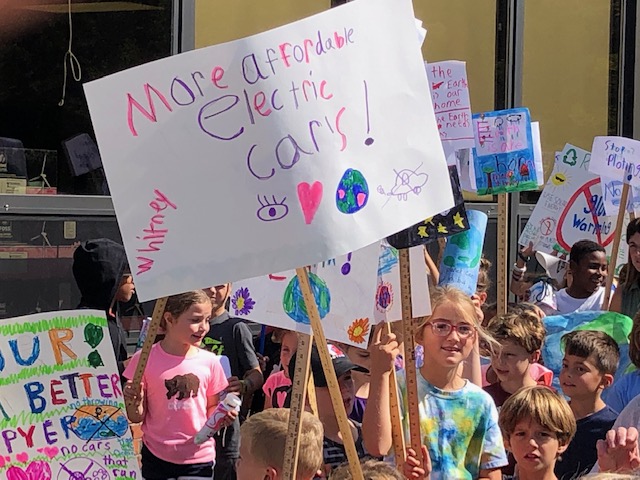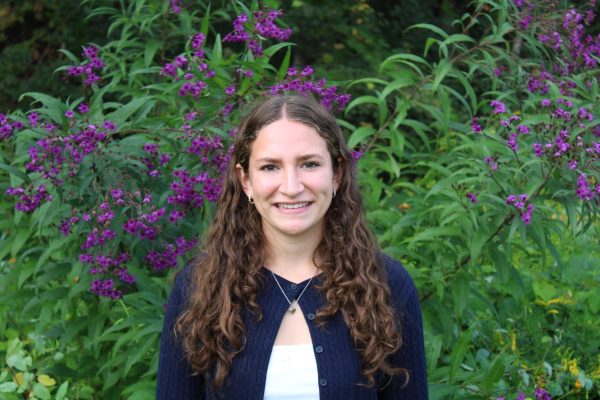On May 12, Wayland unveiled the Loker Elementary School’s new solar panels as a step towards Wayland’s goal for carbon neutrality and sustainability. It marked the end of a longtime project for Loker that initially began in 2021. For Wayland’s leadership in climate action, State Senator James Eldridge awarded the town an official citation on behalf of the Massachusetts State Senate.
The project to implement solar panels at Loker officially began in 2021. It was initially introduced as a long-term capital maintenance project for all town-owned properties. The Loker Elementary School’s roof was approaching 35 years old during this time and required a replacement.
“We had to move buckets around every time it rained because our roof would leak in different places,” Loker Principal Brian Jones said.
This issue was brought up by the School Committee during the Annual Town Meeting held on April 5, 2020. The town voted to fund the roof replacement at Loker Elementary and endorse the Power Purchase Agreement Contract for 20 years. The Power Purchase Agreement is an agreement within the town to buy the electricity produced by the solar panels at a lower, fixed rate, which will save the town money over time.
“[The project] was to replace the entire roof of the Loker elementary school and do a couple of HVAC [Heating, Ventilation and Air Conditioning] upgrades and electrical upgrades with that,” Sustainability Manager Abigail Shute said.
However, renovating Loker’s roof turned into something more important, as people began to see it as an opportunity to turn the school’s energy into solar power.
“During that process [to replace the roof], it became apparent that there was a really unique opportunity to have solar panels, which would help provide power not only to the building, but to the Town of Wayland,” Jones said.
While the project for Loker began in 2021, adding solar panels has been commonly advocated for across multiple elementary schools in Wayland, including Happy Hollow. In 2019, students from Happy Hollow sent out a petition along with a letter to the Wayland Town Council, asking for solar panels for the school.
“All the elementary school classes went through and they signed this little agreement,” Shute said. “The teachers had them do it, and they drew little pictures, saying ‘we want to see solar.’”
In June 2022, the Wayland Select Board adopted the outline of the project created by the Climate Action Mobilization Plan, the goal being to complete the Loker Solar Project. The role of sustainability manager was created, where Shute was appointed in April 2023 and collaborated with the Energy and Climate Committee, along with the former Director of Public Buildings, Ben Keefe.
“Ben Keefe was a huge proponent for solar,” Shute said. “He was a big advocate for anything green energy.”
The total cost of the project was $4.3 million, including all electrical upgrades such as the roof.
“Electrical upgrades are very, very expensive, like that school [Loker] was originally built around the 1970s [or] 1960s, so the electrical capacity back then was a lot different than it is now,” Shute said.
Installation began in August 2024 and finished in December. In May of 2025, the project received interconnection approval — permission to operate from the electrical utility in order to safely connect solar panels to the electrical grid.
“These last steps can take a long time because the utility company must carefully review the system design, ensure it won’t overload the grid, inspect the installation for safety and coordinate approvals,” Shute said.
Jones hopes that this project can not only inspire others, but can better inform students on the power of solar energy, and how to protect our environment.
“The solar panels are an amazing opportunity to utilize less power, but also an opportunity to teach our students here at Loker about what solar energy is, why having the solar panels is such an important thing and how they can be more green,” Jones said.
Aside from the solar panels, the Wayland Sustainability Department is also working with the Metropolitan Area Planning Council (MAPC) on the Accelerating Climate Resilience (ARC) grant.
“We’re going to be focusing on extreme weather and emergency response with young Wayland families and then high school students,” Town Sustainability Coordinator Olivia Blaney said.
This grant is specifically looking at using solar chargers for electric vehicles. It’s a part of a larger plan towards a more sustainable future.
“We’re actually working on quite a few things,” Shute said. “The brand new Council on Aging and Community Center is coming online, and that’s going to be our first fully electric building in town.”
With the opening for the community center along with the new solar panels installed at Loker, Shute hopes that this will inspire others to follow in Wayland’s footsteps toward sustainability and carbon neutrality.
“Our hope is to bring everybody together, even in our community [and] to show our neighbors what we’re capable of doing,” Shute said.




























